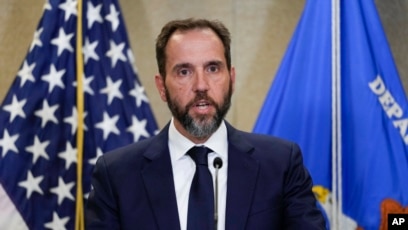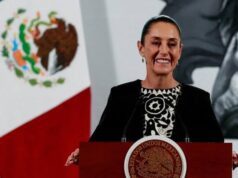Jack Smith resigns as Trump prosecutor implications for cases

By Damsana Ranadhiran
In a significant development, US Special Counsel Jack Smith has resigned after completing his investigation into two high-profile federal cases involving President-elect Donald Trump.
Court documents filed on January 11, 2025, revealed Smith’s departure following the submission of his final confidential report. The cases, which center on the alleged mishandling of classified documents and interference in the 2020 election, mark a contentious chapter in Trump’s legal and political career.
Jack Smith was appointed as Special Counsel to oversee two of the four criminal cases brought against Trump after his first presidency. The classified documents case alleges that Trump improperly retained and mishandled sensitive materials upon leaving office.
The second case focuses on allegations of Trump’s attempts to overturn the results of the 2020 presidential election, an issue that has remained a point of contention since his defeat.
Smith’s resignation comes amid a backdrop of legal and political controversy. His tenure as Special Counsel faced criticism from Trump and his allies, who have repeatedly dismissed the charges as politically motivated. Trump’s impending return to the White House has only heightened tensions surrounding these cases.
One of the most controversial aspects of Smith’s investigation involves the alleged mishandling of classified documents. Trump is accused of taking sensitive government materials to his Mar-a-Lago residence in Florida after leaving office in January 2021.
The prosecution argued that such actions compromised national security and violated federal law.
District Judge Aileen Cannon is currently presiding over this case. Her decision to temporarily block the release of a portion of Smith’s final report has drawn scrutiny.
The injunction, which remains in effect until January 13, delays public access to key findings and has sparked debate about transparency in the judicial process.
The Special Counsel’s motion urging Judge Cannon not to extend the block highlights the urgency of resolving the matter.
According to the brief footnote in the court filing, Smith officially separated from the Department of Justice (DOJ) on January 10, just days after submitting his final report.The second major case under Smith’s purview involved allegations that Trump sought to overturn the 2020 election results.
Court documents released on January 8 indicated that Attorney General Merrick Garland intends to publicly disclose Smith’s findings in this case.
This move is expected to shed light on Trump’s actions following his electoral defeat and the subsequent efforts to challenge the outcome.
While Smith’s report on the classified documents case remains partially under wraps, the election interference findings are poised to reignite public debate.
The issue has already shaped Trump’s political narrative, with the president-elect framing the charges as a “witch hunt.”Notably, neither of the cases overseen by Smith proceeded to trial.
In July 2024, Judge Cannon dismissed the classified documents case, citing insufficient evidence to warrant prosecution. Similarly, DC District Judge Tanya Chutkan dropped the election interference case in November 2024, referencing the legal immunity afforded to a sitting US president.
These dismissals have fueled criticism from legal experts and political opponents who argue that the justice system failed to hold Trump accountable.
For his part, Trump has maintained his innocence, describing the investigations as “lawless” and asserting that the charges lack merit.
Smith’s resignation occurs just ten days before Trump’s inauguration on January 20. The timing has raised questions about the future of the DOJ’s handling of these cases under a Trump administration.
During his campaign, Trump vowed to fire Smith “within two seconds” of taking office, signaling his intention to overhaul the DOJ’s leadership.
With Smith’s departure, the question remains whether the DOJ will pursue further legal action against Trump or shift focus under new leadership.
Legal analysts predict that the incoming administration’s stance could significantly impact the resolution of these cases and set a precedent for future investigations involving high-ranking officials.
Adding to Trump’s legal woes is the recent ruling in the “hush money” case brought against him in New York. On January 10, a judge sentenced Trump without imposing fines or jail time.
However, the ruling carries significant consequences, as Trump will now be classified as a felon under US law. This case involves allegations that Trump directed illegal payments to silence individuals with potentially damaging information during his 2016 presidential campaign.
While the hush money case is separate from Smith’s investigations, it underscores the breadth of Trump’s legal challenges as he prepares to re-enter the Oval Office.
The cumulative impact of these cases on Trump’s presidency and legacy remains uncertain.
Smith’s resignation and the ongoing legal battles against Trump highlight the intersection of law and politics in contemporary America.
The cases have not only shaped public discourse but also tested the limits of presidential accountability. Trump’s claims of a politically motivated “witch hunt” have resonated with his base, reinforcing his narrative of victimization and resilience.
For the DOJ, Smith’s departure represents a turning point. The Special Counsel’s role was to ensure impartiality and thoroughness in investigating the former president.
With his exit, the responsibility now shifts to other DOJ officials and the broader legal system to uphold the principles of justice and transparency.
As Trump prepares to assume office, the fate of the federal cases against him remains uncertain. The release of Smith’s reports, particularly on the classified documents and election interference cases, could influence public opinion and potentially impact Trump’s second term.
Additionally, the DOJ’s approach under the new administration will be closely watched, as it may set the tone for future investigations involving political figures.
In the meantime, the political landscape is likely to remain polarized. Trump’s legal battles have galvanized supporters and critics alike, making them a focal point of national debate.
Whether these cases ultimately lead to accountability or further entrench division will depend on the judiciary’s ability to navigate the complex interplay of law, politics, and public opinion.




